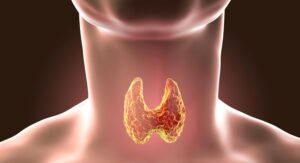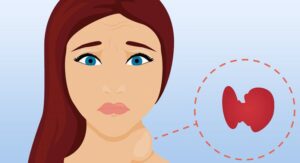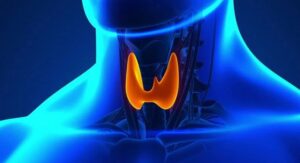 The treatment of thyroid depends on which type of thyroid is diagnosed, and the effects on the gland and patient symptoms. In some cases, thyroid hormone replacement is used to treat hypothyroidism. The treatment is often tapered off, to determine if the hypothyroidism is permanent and sometimes requires continuous treatment. Painful forms of thyroid are sometimes treated with non- steroidal and anti-inflammatory medications, such as ibuprofen or aspirin. For severe or prolonged thyroiditis minimal dose of steroid are used. Thyroid is a gland located at the base of your neck, just below your adam’s apple. It is shaped like a butterfly – each wing or lobe of your thyroid lies on either side of your windpipe. The purpose of your thyroid gland is to make, store and release thyroid hormones into your blood.
The treatment of thyroid depends on which type of thyroid is diagnosed, and the effects on the gland and patient symptoms. In some cases, thyroid hormone replacement is used to treat hypothyroidism. The treatment is often tapered off, to determine if the hypothyroidism is permanent and sometimes requires continuous treatment. Painful forms of thyroid are sometimes treated with non- steroidal and anti-inflammatory medications, such as ibuprofen or aspirin. For severe or prolonged thyroiditis minimal dose of steroid are used. Thyroid is a gland located at the base of your neck, just below your adam’s apple. It is shaped like a butterfly – each wing or lobe of your thyroid lies on either side of your windpipe. The purpose of your thyroid gland is to make, store and release thyroid hormones into your blood.
The thyroid uses iodine, a mineral found in some foods and in iodized salt, to make its hormones. These hormones, which are also referred to as t3 (tri iodo thyronine) and t4 (thyroxine) affects almost every part in your body, and help to control your body’s functions.
 If you have too little thyroid hormone in your blood, your body slows down. This condition is called hypothyroidism. If you have too much thyroid hormone in your blood, your body speeds up, this condition is called hyperthyroidism. Thyroid hormones are essential for the function of every cell in the body. They help to regulate growth and the rate of chemical reactions (metabolism) in the body. Thyroid hormones also help children to grow and develop physically and mentally. The thyroid gland also makes the hormone calcitonin, which in involved in calcium metabolism and stimulating bone cells to add calcium to bone. The amount of thyroid hormone made by your thyroid gland is adjusted by a gland in the brain called the pituitary. Another part of your brain, the hypothalamus helps the pituitary. The hypothalamus sends information to the pituitary gland, the pituitary in turn controls the thyroid gland.
If you have too little thyroid hormone in your blood, your body slows down. This condition is called hypothyroidism. If you have too much thyroid hormone in your blood, your body speeds up, this condition is called hyperthyroidism. Thyroid hormones are essential for the function of every cell in the body. They help to regulate growth and the rate of chemical reactions (metabolism) in the body. Thyroid hormones also help children to grow and develop physically and mentally. The thyroid gland also makes the hormone calcitonin, which in involved in calcium metabolism and stimulating bone cells to add calcium to bone. The amount of thyroid hormone made by your thyroid gland is adjusted by a gland in the brain called the pituitary. Another part of your brain, the hypothalamus helps the pituitary. The hypothalamus sends information to the pituitary gland, the pituitary in turn controls the thyroid gland.
 The thyroid gland, pituitary gland ad hypothalamus all work together to control the amount of thyroid hormone in your body. With the pituitary controlling most of the action, these organs work similarly to the way a thermostat controls temperature in a room. Structural problems can include an enlarged thyroid gland (goitre), a small thyroid gland (atrophic) or the development of either single nodules (solitary thyroid nodule) or multiple thyroid nodules (multi nodular goitre). Functional problems of the thyroid are initially evaluated with thyroid function tests which are used to determine if the thyroid is functioning normally, overactive or under active. Often times a thyroid gland can have both a structural problem and a functional problem at the same time. So the evaluation of a thyroid condition includes careful evaluation of both the structure and function of the thyroid gland.
The thyroid gland, pituitary gland ad hypothalamus all work together to control the amount of thyroid hormone in your body. With the pituitary controlling most of the action, these organs work similarly to the way a thermostat controls temperature in a room. Structural problems can include an enlarged thyroid gland (goitre), a small thyroid gland (atrophic) or the development of either single nodules (solitary thyroid nodule) or multiple thyroid nodules (multi nodular goitre). Functional problems of the thyroid are initially evaluated with thyroid function tests which are used to determine if the thyroid is functioning normally, overactive or under active. Often times a thyroid gland can have both a structural problem and a functional problem at the same time. So the evaluation of a thyroid condition includes careful evaluation of both the structure and function of the thyroid gland.
A thyroid nodule is a collection of cells within the thyroid that grow and produce a lump. In most patients, a thyroid cancer nodule is painless and usually the patient was unaware that the nodule was present until it was detected by the family physician or a radiologic study. While not usually present, several features do make it more likely for a thyroid nodule to be thyroid cancer (rapid increase in size, changes in the voice, difficulty swallowing, difficulty in breathing, family history of thyroid cancer, or prior history of radiation exposure during childhood).
